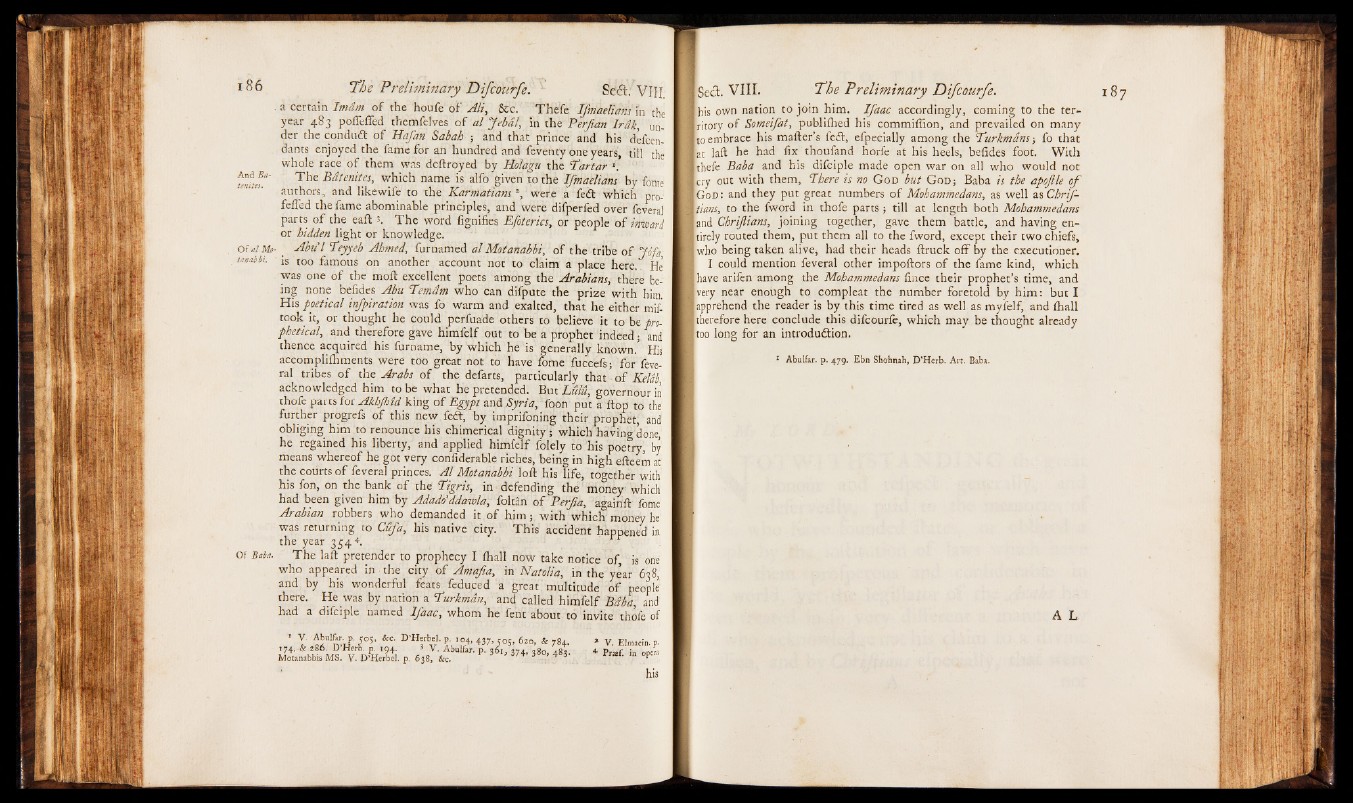
i86
And Bate?}
il es.
O f al Motanabbi.
Of Baba.
‘The Preliminary Difcourfe. Sed. V lII
a certain Imam of the houfe of Alt, &c. Thefe Ifmaetiatism the
year 483 poffeffed themfelves of al Jebdl, in the Per fa n Irak, tinder
the conduit o f HaJ'an Sabah ; and that prince and his defendants
enjoyed the fame for an hundred and feventy one years, till the
whole race of them was deftroyed by Holagu the "Tartar
The Bdtenites, which name is alfo given to the Ifmaelians by fome
authors, and likewife to the Karmatians % were a fedt which pro-
feffed the fame abominable principles, and were difperfed over feveral
parts of the eaft s. The word fignifies Efoterics, or people of inward
or hidden light or knowledge.
Abu l Teyyeb Ahmed, furnamed alMotanabbi, of the tribe of J/.fa,
is too famous on another account not to claim a place here. He
was one of the mod excellent poets among the Arabians, there being
none befides Abu Temdm who can difpute the prize with him.
His poetical infpiration was fo warm and exalted, that he either mif-
took it, or thought he could perfuade others to believe it to be prophetical,
and therefore gave himfelf out to be a prophet indeed; and
thence acquired his furname, by which he is generally known/ His
accomplilhments were too great not to have fome fuccefs; for feveral
tribes of the Arabs of the defarts, particularly that of Kelab,
acknowledged him to be what he pretended. But Lulu, governour in
thofe parts for Akhjhid king of Egypt and Syria, foon put a flop to the
further progrefs of this new fedt, by imprifoning their prophet, and
obliging him to renounce his chimerical dignity ; which having done,
he regained his liberty, and applied himfelf folely to his poetry, by
means whereof he got very confiderable riches, being in high efteetn at
the courts of feveral princes. A l Motanabbi loft his life, together with
his fon, on the bank of the Tigris, in defending the money: which
had been given him by Adado'ddawla, foltan of Perjia, againft fome
Arabian robbers who demanded ic of him; with which money he
was returning to Cufa, his native city. This accident happened in
the year 354+ ' .
The laft pretender to prophecy I fhall now take notice of is one
who appeared in the city of Amafia, in Natolia, in the year 638,
and by his wonderful feats deduced a great, multitude of people
there. He was by nation a Turkmdn, and called himfelf Baba, and
had a difciple named lfaac, whom he fent about to invite thofe of
1 V. Abulfar. p. 505, &c. D’Herbel. p. 104, 437, 505, 620, & 784.
174, & 286^ D’Herb. p. 194. 3 V. Abulfar. p. 361, 374, 380, 483.
Motanabbis MS. V. D’Herbel. p. 638, &c. mÊÊ *
* V. EJmacin. p-
4 Præf. in opera
his
■ S e c t . VIII. 'The Preliminary Difcourfe.
I h i s own nation to join him. lfaac accordingly, coming to the ter-
I r i t o r y of Someifat, published his commiffion, and prevailed on many
■ toembrace his mafter’s fedt, efpecially among the Turkmans-, fo that
■ at laft he had fix thoufand horfe at his heels, befides foot. With
■ thefe Baba and his difciple made open war on all who would not
■ cry out with them, There is no G o d but G o d ; Baba is the apojlle o f
■ Go d : and they put great numbers of Mohammedans, as well as Chrtf-
I tians, to the fword in thofe parts ; till at length both Mohammedans
land Chrijlians, joining together, gave them battle, and having en-
Itirely routed them, put them all to the fword, except their two chiefs,
■ who being taken alive; had their heads ftruck off by the executioner.
I could mention feveral other impoftors of the fame kind, which
■ have arifen among the Mohammedans fince their prophet’s time, and
■ very near enough to compleat the number foretold by him: but I
■ apprehend the reader is by this time tired as well as myfelf, and fhall
■ therefore here conclude this difcourfe, which may be thought already
■ too long for an introdudfion.
1 Abulfar. p. 479. Ebn Shohnah, D’Herb. Art. Baba.